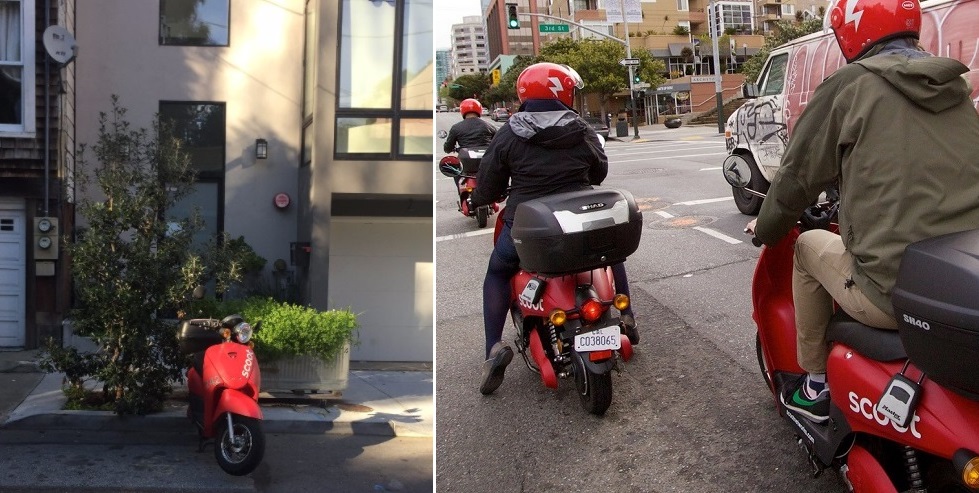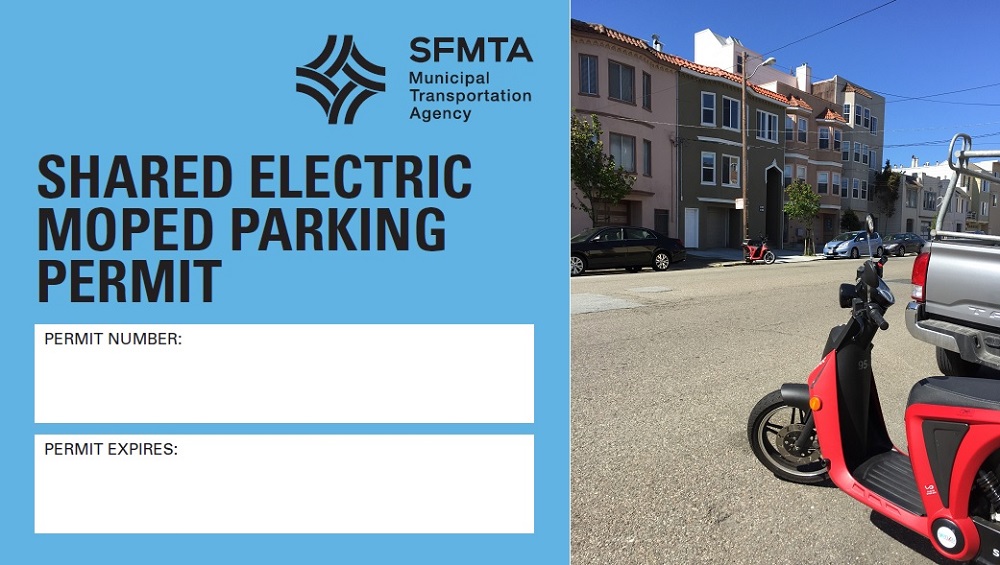
Left photo: Scoot | Right photo: Marcin Wichary/Flickr
Update: On Tuesday June 20, the Shared Electric Moped Parking Permit Program was approved by the SFMTA Board of Directors. The board voted to lift the 8-foot curb space limit and allow permitted shared e-mopeds to park along any curb in Residential Parking Permit areas.
Over the last few years, you've probably noticed the rise of Scoot – the first major provider of shared electric mopeds (e-mopeds) in San Francisco.
Shared e-mopeds, which are rented with a smartphone app (in Scoot's case), are one of the newest transportation options to emerge in the city's evolving landscape of shared vehicle services, which is predominated by car sharing. To help ensure we regulate and facilitate this service in a way that benefits our city, we've worked with Scoot to learn more about its needs and impacts.
Through that work, we've developed a proposed parking permit program for shared e-mopeds which is set to go to the SFMTA Board of Directors for approval next Tuesday, June 20.
Mainly, the permit would allow shared e-mopeds to continue to be parked on streets with Residential Parking Permit restrictions, as long as the curb space they occupy is no wider than 8 feet. That policy has been in place on a trial basis since 2015.
Shared E-Mopeds: Part of the Solution
Shared e-mopeds aren't just scooters to rent for fun – they're a piece of the puzzle to making it easier for us all to get around.
Through our evaluation of surveys and data on travel patterns, we've found that they provide residents an affordable, flexible transportation option that reduces traffic congestion, produces no local greenhouse gas emissions and makes it easier for people to get around without owning a private vehicle.
That last part is key. When residents have shared vehicles conveniently available, it's easier for them to sell their car or forego buying a new one, which helps keep parking spaces open for those who need them most.
Why Shared E-Mopeds Need a New Type of Parking Permit
When Scoot's red “scoots” aren't in use, they’re parked at charging stations in a parking lot or garage, or on the street. Like other mopeds and motorcycles, they're often parked in the small curb spaces between cars or short "scrap" curb segments between driveways.
While that arrangement generally works well, it becomes a bit complicated in Residential Parking Permit (RPP) areas, where there's a time limit for vehicles parked on the street without an RPP sticker displayed. A shared vehicle can't be registered for an RPP, so neighbors who use shared e-mopeds in these areas can’t park near their home without risking a ticket.
So in August 2015, we launched a trial policy that allowed all e-mopeds to be parked in RPP areas as long as they were parked in curb spaces that are 8 feet wide or less.
Based on the observations and public feedback we gathered during the trial, we found that the policy generally works, and we've proposed continuing it in the form of a new type of parking permit just for shared e-mopeds.

This parking permit sticker would exempt shared e-mopeds from time limits in Residential Parking Permit areas.
The Proposed Permit
Under our proposal, shared e-mopeds that display these new permit stickers would be exempted from:
- RPP time limits, only at curbside parking spaces that are 8 feet wide or less, or in a motorcycle parking stall
- Payment in metered motorcycle parking stalls
- Payment in metered parallel parking spaces, if they're parked on the line between spaces
Here are a few other key facts to know:
- These permits would only be available to “Shared Electric Moped Organizations" which provide pre-approved members access to a citywide network of at least 100 shared e-mopeds.
- Each permit would cost $325 per year. Like residential parking permits, the rate is set to cover the estimated cost to administer and enforce the program.
- Permitted providers would be required to share data on e-moped usage and parking to help the SFMTA address issues (e.g. crowding) as needed.
If the program is approved by the SFMTA board on Tuesday, permits for shared e-moped would be issued starting this summer. From there, we’d continue to evaluate the program’s effectiveness for any adjustments needed, including whether to keep the 8-foot curb space limit on parking shared e-mopeds in RPP areas.